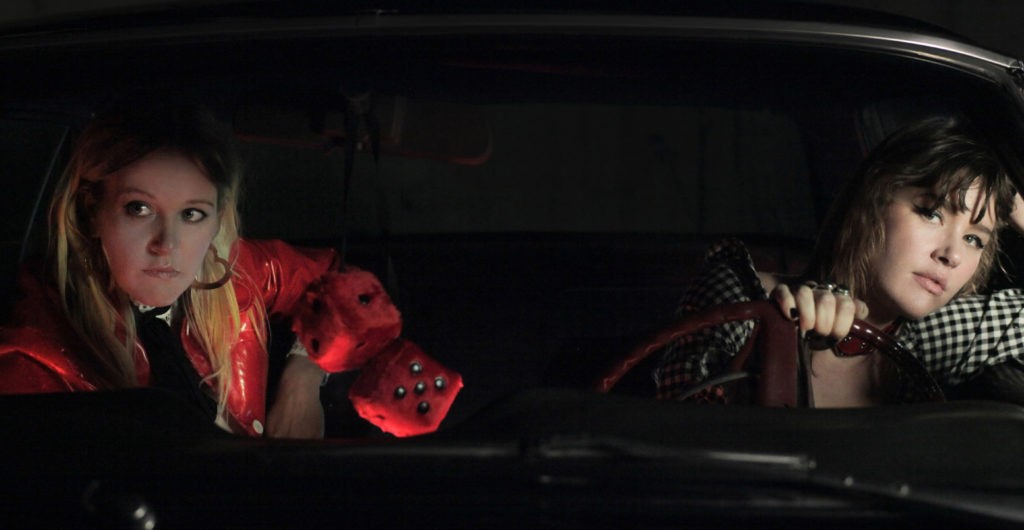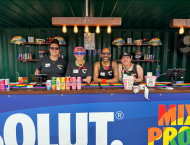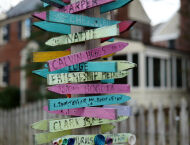Music
 Jennifer and Jessica Clavin of Bleached // Photo: Nicky Giraffe
Jennifer and Jessica Clavin of Bleached // Photo: Nicky Giraffe
Bleached Talk Touring, Sobriety and Being Kind to Your Inner Teenager
September 12, 2019 @ 12:00am
Sisters Jennifer and Jessica Clavin have a longstanding history with music. Growing up around the entertainment world in Los Angeles with a parent in the industry, they took to the craft at a young age and eventually went on to form punk band Mika Miko. After the dissolution of that group, the Clavin sisters came together once again to form Bleached, an honest but relatable, realistic but still sunny, band that’s been around since 2011.
While anyone in the music industry for as long as these sisters is bound to look for inspiration in different places, it truly came from the unexpected on their most recent album cycle – getting sober. As the sisters exited a hiatus and worked to improve themselves and their music, they found going through this change (and doing it together) was an empowering and vulnerable way to make music. On Tap chatted with Jennifer (vocals, guitar and synths) about this life changing process, life on the road and learning to have self-compassion ahead of their upcoming stop in DC.
On Tap: Your new album Don’t You Think You’ve Had Enough has been out in the world since July. Now that you’re a few months into the album cycle, what’s it been like being on tour and hearing fan responses?
Jennifer Clavin: I think we’ve got three or four shows on the tour so far. The fan reactions are just so positive and uplifting. Sometimes there are these weird downtimes where you make the record and then you put it down, and you’re just kinda sitting with it before it comes out. And then [the record] came out and then…it’s not really until the live shows I think [we] can really tell [what the response is]. So far it’s been awesome.
OT: Has anything surprised you about the way that fans have responded to the album in general, or to certain songs?
JC: It’s funny because when we were first putting together the album, we didn’t know what songs to make the singles. Like there was a debate between us and our manager and the label. And so now I have proof that “Daydream” and “Somebody Dial Nine One One” are a lot of people’s favorites. And then likewise, I can tell everyone gets super excited for “Hard to Kill.”
OT: You’ve talked a lot about how your sobriety kind of affected your songwriting process and musicianship. Walk me through how that affected this album and why you guys decided to make this change in your life.
JC: Well, it wasn’t a planned decision. I woke up one morning and I was like, ‘I can’t live my life like this anymore.’ I just decided I needed to get sober and then when we started getting the record [together], it was just a very different type of experience than I’d had writing previous records. I feel like the biggest thing was just being present with everything: with every thought, with every feeling, with every reaction. When in the past I could literally check out if I wanted to with drugs or alcohol, which I would do. It was really cool to be more a part of the whole experience.
I guess sometimes it can be scary, right? Just having to be present for all of that and not having the option to check out. But I had to find other ways and use other tools, whether it be meditation, going outside, walking down the street and getting an iced tea or talking to friends. When we were doing the lyrics, I was just thinking about so much stuff from my past that I was trying to let go of. And so singing it over and over and over again, I was just like, ‘I feel insane.’
OT: Yeah. I think a lot about how I have songs that mean so much to me that I can’t listen to anymore because they just affect me emotionally. So I can’t imagine, as a musician – especially for you all, who have been making music for such a long time – having these almost constant reminders of certain parts of your life.
JC: Yeah, totally. It’s similar to that. I remember one time not-so-long-ago we were in Amsterdam playing a show and there was a song about my boyfriend at the time and then we ended up breaking up and I remember playing that [song that] night, crying and trying not to let anybody see that I was crying on stage. Even the process of having to say the lyrics over and over, it was like a form of letting go in a way. But this is one of my most favorite records we’ve ever written. So it’s showed me that doing this whole thing sober and being present actually produced the best record, in my opinion.
OT: I’ve noticed an uptick in people, especially in creative circles, embracing sobriety. I recently read a book called Sober Curious about someone who was a journalist and then went on a similar journey. It’s just very interesting to see almost a prioritization of overall health, and actually being with your feelings. As somebody who’s gone through getting sober and making this change, why do you think people are starting to be more cognizant of their drinking habits?
JC: [People] have talked about how to do it [on] social media. There are people being super honest about their struggles and their journey – people that we and other people look up to. I feel like that probably is such a big part of it. I think before, you never really knew what other people were going through. You felt very alone in that journey if you were trying to get sober. Now, there’s just so much more support. I feel like that’s almost like the most important ingredient in sobriety is having that support and not just like isolating yourself.
OT: You and your sister have been in the music world for quite a while now, as Bleached and past projects. You also grew up in the music world. How has your relationship with music, personally and professionally, changed over time.
JC: That’s a really good question, because we’re actually on tour with these younger girls right now called The Paranoyds. They were all big fans of our first band, Mika Miko. Watching them is really taking me back to when I first started playing music, first started going on tour, [and was] trying to figure stuff out. It’s funny cause I didn’t have any confidence back then but they all seem, at least to me, very confident and sure of themselves. It’s just really cool to watch and be like, ‘Oh, I probably was, I was cool like them, too.’ But I just didn’t know it because I was so insecure. Now over time, I’ve been being more loving toward myself and having more compassion and just working on myself to where I can now play a song and just feel super proud.
OT: I always think it’s interesting how, having been a former teenage girl, I have so much compassion for them. I didn’t have that same compassion for myself at the time I was that age, though. I recently started to reflect on how teenage me is still there, too, and I still need to be nice to her and to my current self.
JC: Exactly. That’s another thing, as we are playing these shows and seeing [teenage girls] there it has been bringing back that exciting feeling I feel you kind of lose along the way. Where everything’s so new and maybe it’s a little scary. It’s also just really exciting, you know? And it’s like, just where my brain is right now, too.
Bleached plays U Street Music Hall on Tuesday, September 17. For more on their new record, visit hellobleached.com.
U Street Music Hall: 1115 U St. NW, DC; 202-588-1889; www.ustreetmusichall.com







